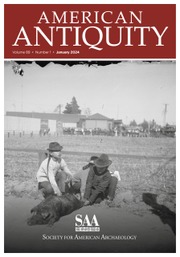Article contents
What is Archaeology's “Mitigated Objectivism” Mitigated by? Comments on Wylie
Published online by Cambridge University Press: 20 January 2017
Abstract
In her recent work, Alison Wylie has sometimes claimed an important role for present politics in the constitution of archaeological facts, yet she has not fully documented such claims. Using the same materials as Wylie, namely the research on gender presented at the conference “Women and Production in Prehistory,” held in South Carolina in 1988, I attempt to provide such documentation, arguing that its absence may undermine Wylie's (indeed, archaeology's) “mitigated objectivism” as well as the facts emerging about prehistoric gender. I dispute neither the scientific integrity of those facts nor the rigor of Wylie's analysis. Like many before me, I puzzle about the relationship between truth and politics, and I regard the disjunction of the two notions, so obdurate in archaeology, as counterproductive, the source of contradictions and disabling ambivalences. I make at the end two suggestions about overcoming the notional disjunction of truth and politics, one adopted from Brumfiel and from Conkey (archaeological facts as allegories), the other from Foucault (archaeological evidence as a network of sites of power).
Resumen
En su trabajo reciente, Alison Wylie ha afirmado algunas veces la importancia del papel que la política presente juega en la constitución de los hechos arqueológicos, pero ella no ha documentado suficientemente tal afirmación. Utilizando los mismos materiales que ella ha utilizado, esto es, la investigación sobre género presentados en 1988 en la conferencia “La Mujer y la Producción en la Prehistoria” en Carolina del Sur, yo intento proveer esta documentación, y arguyo que su ausencia perjudica el “objetivismo mitigado” de Wylie (y de hecho de la arqueología) así como los hechos que emergen acerca del género prehistórico. Yo no disputo la integridad científica de esos hechos o el rigor del análisis de Wylie. Así como lo han hecho muchos antes que yo, simplemente me pregunto cuál es la relación entre verdad y política, y considero que la disyunción entre estas dos nociones, tan recalcitrantes en la arqueología, es contraproducente y constituye una fuente de contradicciones y ambivalencias. Yo hago dos sugerencias sobre cómo sobreponerse a la disyunción entre verdad y política, la primera adoptada de Brumftel y Conkey (los hechos arqueológicos como alegorías), y la segunda de Foucault (la evidencia arqueológica como una red de puestos de poder).
- Type
- Comments
- Information
- Copyright
- Copyright © The Society for American Archaeology 1994
References
References Cited
- 29
- Cited by


